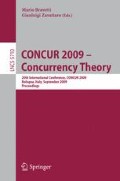Abstract
We present a general framework allowing to classify testing problems into five testability classes. Classes differ in the number of tests we must apply to precisely determine whether the system is correct or not. The conditions that enable/disable finite testability are analyzed. A general method to reduce a testing problem into another is presented. The complexity of finding complete test suites and measuring the suitability of incomplete suites is analyzed.
Work supported by projects TIN2006-15578-C02-01, CCG08-UCM/TIC-4124, and the UCM-BSCH programme (GR58/08 - group number 910606).
Access this chapter
Tax calculation will be finalised at checkout
Purchases are for personal use only
Preview
Unable to display preview. Download preview PDF.
References
Bernot, G., Gaudel, M.-C., Marre, B.: Software testing based on formal specification: a theory and a tool. Software Engineering Journal 6, 387–405 (1991)
Brinksma, E., Tretmans, J.: Testing transition systems: An annotated bibliography. In: Cassez, F., Jard, C., Rozoy, B., Dermot, M. (eds.) MOVEP 2000. LNCS, vol. 2067, pp. 187–195. Springer, Heidelberg (2001)
Do, H., Rothermel, G., Kinneer, A.: Prioritizing JUnit test cases: An empirical assessment and cost-benefits analysis. Empirical Software Engineering 11(1), 33–70 (2006)
Gaston, C., Le Gall, P., Rapin, N., Touil, A.: Symbolic execution techniques for test purpose definition. In: Uyar, M.Ü., Duale, A.Y., Fecko, M.A. (eds.) TestCom 2006. LNCS, vol. 3964, pp. 1–18. Springer, Heidelberg (2006)
Gaudel, M.-C.: Testing can be formal, too. In: Mosses, P.D., Schwartzbach, M.I., Nielsen, M. (eds.) CAAP 1995, FASE 1995, and TAPSOFT 1995. LNCS, vol. 915, pp. 82–96. Springer, Heidelberg (1995)
Hennessy, M.: Algebraic Theory of Processes. MIT Press, Cambridge (1988)
Hierons, R.M.: Comparing test sets and criteria in the presence of test hypotheses and fault domains. ACM Trans. on Software Engineering and Methodology 11(4), 427–448 (2002)
Hierons, R.M.: Verdict functions in testing with a fault domain or test hypotheses. In: ACM Transactions on Software Engineering and Methodology (2008) (to appear)
Hopcroft, J.E., Karp, R.M.: An n 5/2 algorithm for maximum matchings in bipartite graphs. SIAM Journal on Computing 2(4), 225–231 (1973)
Lee, D., Yannakakis, M.: Principles and methods of testing finite state machines: A survey. Proceedings of the IEEE 84(8), 1090–1123 (1996)
López, N., Núñez, M., Rodríguez, I.: Specification, testing and implementation relations for symbolic-probabilistic systems. Theoretical Computer Science 353(1–3), 228–248 (2006)
Merayo, M., Núñez, M., Rodríguez, I.: Extending EFSMs to specify and test timed systems with action durations and timeouts. IEEE Transactions on Computers 57(6), 835–844 (2008)
Petrenko, A.: Fault model-driven test derivation from finite state models: Annotated bibliography. In: Cassez, F., Jard, C., Rozoy, B., Dermot, M. (eds.) MOVEP 2000. LNCS, vol. 2067, pp. 196–205. Springer, Heidelberg (2001)
Rodríguez, I.: A general testability theory: Extended version (2006), http://kimba.mat.ucm.es/ismael/
Rodríguez, I., Merayo, M.G., Núñez, M.: \(\mathcal{HOTL}\): Hypotheses and observations testing logic. Journal of Logic and Algebraic Programming 74(2), 57–93 (2008)
Springintveld, J., Vaandrager, F., D’Argenio, P.R.: Testing timed automata. Theoretical Computer Science 254(1-2), 225–257 (2001); Previously appeared as Technical Report CTIT-97-17, University of Twente (1997)
Stoelinga, M., Vaandrager, F.: A testing scenario for probabilistic automata. In: Baeten, J.C.M., Lenstra, J.K., Parrow, J., Woeginger, G.J. (eds.) ICALP 2003. LNCS, vol. 2719, pp. 464–477. Springer, Heidelberg (2003)
Tretmans, J.: Testing concurrent systems: A formal approach. In: Baeten, J.C.M., Mauw, S. (eds.) CONCUR 1999. LNCS, vol. 1664, pp. 46–65. Springer, Heidelberg (1999)
Author information
Authors and Affiliations
Editor information
Editors and Affiliations
Rights and permissions
Copyright information
© 2009 Springer-Verlag Berlin Heidelberg
About this paper
Cite this paper
Rodríguez, I. (2009). A General Testability Theory. In: Bravetti, M., Zavattaro, G. (eds) CONCUR 2009 - Concurrency Theory. CONCUR 2009. Lecture Notes in Computer Science, vol 5710. Springer, Berlin, Heidelberg. https://doi.org/10.1007/978-3-642-04081-8_38
Download citation
DOI: https://doi.org/10.1007/978-3-642-04081-8_38
Publisher Name: Springer, Berlin, Heidelberg
Print ISBN: 978-3-642-04080-1
Online ISBN: 978-3-642-04081-8
eBook Packages: Computer ScienceComputer Science (R0)

